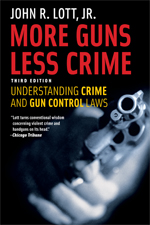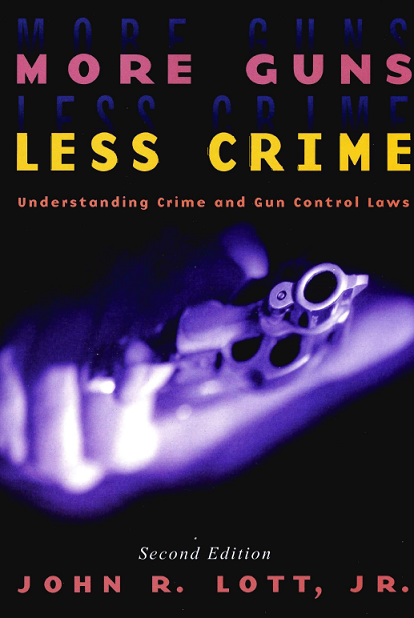[center]
[large]John R. Lott Jr.
More Guns Less Crime[/large][/center]

[justify]Question: What does the title mean: More Guns, Less Crime?
John R. Lott, Jr.: States with the largest increases in gun ownership also have the largest drops in violent crimes. Thirty-one states now have such laws?called "shall-issue" laws. These laws allow adults the right to carry concealed handguns if they do not have a criminal record or a history of significant mental illness.
Question: It just seems to defy common sense that crimes likely to involve guns would be reduced by allowing more people to carry guns. How do you explain the results?
Lott: Criminals are deterred by higher penalties. Just as higher arrest and conviction rates deter crime, so does the risk that someone committing a crime will confront someone able to defend him or herself. There is a strong negative relationship between the number of law-abiding citizens with permits and the crime rate?as more people obtain permits there is a greater decline in violent crime rates. For each additional year that a concealed handgun law is in effect the murder rate declines by 3 percent, rape by 2 percent, and robberies by over 2 percent.
Concealed handgun laws reduce violent crime for two reasons. First, they reduce the number of attempted crimes because criminals are uncertain which potential victims can defend themselves. Second, victims who have guns are in a much better position to defend themselves.
Question: What is the basis for these numbers?
Lott: The analysis is based on data for all 3,054 counties in the United States during 18 years from 1977 to 1994.
Question: Your argument about criminals and deterrence doesn't tell the whole story. Don't statistics show that most people are killed by someone they know?
Lott: You are referring to the often-cited statistic that 58 percent of murder victims are killed by either relatives or acquaintances. However, what most people don't understand is that this "acquaintance murder" number also includes gang members killing other gang members, drug buyers killing drug pushers, cabdrivers killed by customers they picked up for the first time, prostitutes and their clients, and so on. "Acquaintance" covers a wide range of relationships. The vast majority of murders are not committed by previously law-abiding citizens. Ninety percent of adult murderers have had criminal records as adults.
Question: But how about children? In March of this year [1998] four children and a teacher were killed by two school boys in Jonesboro, Arkansas. Won't tragedies like this increase if more people are allowed to carry guns? Shouldn't this be taken into consideration before making gun ownership laws more lenient?
Lott: The horrific shooting in Arkansas occurred in one of the few places where having guns was already illegal. These laws risk creating situations in which the good guys cannot defend themselves from the bad ones. I have studied multiple victim public shootings in the United States from 1977 to 1995. These were incidents in which at least two or more people were killed and or injured in a public place; in order to focus on the type of shooting seen in Arkansas, shootings that were the byproduct of another crime, such as robbery, were excluded. The effect of "shall-issue" laws on these crimes has been dramatic. When states passed these laws, the number of multiple-victim shootings declined by 84 percent. Deaths from these shootings plummeted on average by 90 percent, and injuries by 82 percent.
For other types of crimes, I find that both children as well as adults are protected when law-abiding adults are allowed to carry concealed handguns.
Finally, after extensively studying the number of accidental shootings, there is no evidence that increasing the number of concealed handguns increases accidental shootings. We know that the type of person who obtains a permit is extremely law-abiding and possibly they are extremely careful in how they take care of their guns. The total number of accidental gun deaths each year is about 1,300 and each year such accidents take the lives of 200 children 14 years of age and under. However, these regrettable numbers of lives lost need to be put into some perspective with the other risks children face. Despite over 200 million guns owned by between 76 to 85 million people, the children killed is much smaller than the number lost through bicycle accidents, drowning, and fires. Children are 14.5 times more likely to die from car accidents than from accidents involving guns.
Question: Wouldn't allowing concealed weapons increase the incidents of citizens attacking each other in tense situations? For instance, sometimes in traffic jams or accidents people become very hostile?screaming and shoving at one another. If armed, might people shoot each other in the heat of the moment?
Lott: During state legislative hearings on concealed-handgun laws, possibly the most commonly raised concern involved fears that armed citizens would attack each other in the heat of the moment following car accidents. The evidence shows that such fears are unfounded. Despite millions of people licensed to carry concealed handguns and many states having these laws for decades, there has only been one case where a person with a permit used a gun after a traffic accident and even in that one case it was in self-defense.
Question: Violence is often directed at women. Won't more guns put more women at risk?
Lott: Murder rates decline when either more women or more men carry concealed handguns, but a gun represents a much larger change in a woman's ability to defend herself than it does for a man. An additional woman carrying a concealed handgun reduces the murder rate for women by about 3 to 4 times more than an additional man carrying a concealed handgun reduces the murder rate for men.
Question: Aren't you playing into people's fears and prejudices though? Don't politicians pass these shall-issue laws to mollify middle-class white suburbanites anxious about the encroachment of urban minority crime?
Lott: I won't speculate about motives, but the results tell a different story. High crime urban areas and neighborhoods with large minority populations have the greatest reductions in violent crime when citizens are legally allowed to carry concealed handguns.
Question: What about other countries? It's often argued that Britain, for instance, has a lower violent crime rate than the USA because guns are much harder to obtain and own.
Lott: The data analyzed in this book is from the USA. Many countries, such as Switzerland, New Zealand, Finland, and Israel have high gun-ownership rates and low crime rates, while other countries have low gun ownership rates and either low or high crime rates. It is difficult to obtain comparable data on crime rates both over time and across countries, and to control for all the other differences across the legal systems and cultures across countries. Even the cross country polling data on gun ownership is difficult to assess, because ownership is underreported in countries where gun ownership is illegal and the same polls are never used across countries.
Question: This is certainly controversial and there are certain to be counter-arguments from those who disagree with you. How will you respond to them?
Lott: Some people do use guns in horrible ways, but other people use guns to prevent horrible things from happening to them. The ultimate question that concerns us all is: Will allowing law-abiding citizens to own guns save lives? While there are many anecdotal stories illustrating both good and bad uses of guns, this question can only be answered by looking at data to find out what the net effect is.
All of chapter seven of the book is devoted to answering objections that people have raised to my analysis. There are of course strong feelings on both sides about the issue of gun ownership and gun control laws. The best we can do is to try to discover and understand the facts. If you agree, or especially if you disagree with my conclusions I hope you'll read the book carefully and develop an informed opinion.[/justify]
http://www.press.uchicago.edu/Misc/Chicago/493636.html [large]More Guns, Less Crime
[large]More Guns, Less Crime [justify]Question: What does the title mean: More Guns, Less Crime?
[justify]Question: What does the title mean: More Guns, Less Crime?